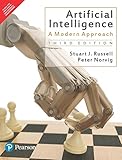Artificial Intelligence : A modern approach
Material type: TextPublication details: Delhi: Pearson India Education Services Ltd., [c2015]Edition: 3rd edDescription: 1145 pISBN: 9789332543515Subject(s): General ScienceLOC classification: Q335
TextPublication details: Delhi: Pearson India Education Services Ltd., [c2015]Edition: 3rd edDescription: 1145 pISBN: 9789332543515Subject(s): General ScienceLOC classification: Q335| Item type | Current library | Collection | Shelving location | Call number | Status | Notes | Date due | Barcode | Item holds |
|---|---|---|---|---|---|---|---|---|---|
 Book
Book
|
ICTS | General Sc | Rack No 3 | Q335 (Browse shelf (Opens below)) | Available | Billno:IN 005 061; Billdate: 2018-03-26 | 01028 |
Part I: Artificial Intelligence
Chapter 1 Introduction
Chapter 2 Intelligent Agents
Part II: Problem-solving
Chapter 3 Solving Problems by Searching
Chapter 4 Search in Complex Environments
Chapter 5 Adversarial Search and Games
Chapter 6 Constraint Satisfaction Problems
Part III: Knowledge, reasoning, and planning
Chapter 7 Logical Agents
Chapter 8 First-Order Logic
Chapter 9 Inference in First-Order Logic
Chapter 10 Knowledge Representation
Chapter 11 Automated Planning
Part IV: Uncertain knowledge and reasoning
Chapter 12 Quantifying Uncertainty
Chapter 13 Probabilistic Reasoning
Chapter 14 Probabilistic Reasoning over Time
Chapter 15 Probabilistic Programming
Chapter 16 Making Simple Decisions
Chapter 17 Making Complex Decisions
Chapter 18 Multiagent Decision Making
Part V: Machine Learning
Chapter 19 Learning from Examples
Chapter 20 Learning Probabilistic Models
Chapter 21 Deep Learning
Chapter 22 Reinforcement Learning
Part VI: Communicating, perceiving, and acting
Chapter 23 Natural Language Processing
Chapter 24 Deep Learning for Natural Language Processing
Chapter 25 Computer Vision
Chapter 26 Robotics
Part VII: Conclusions
Chapter 27 Philosophy, Ethics, and Safety of AI
Chapter 28 The Future of AI
“Artificial Intelligence: A Modern Approach” by Peter Norvig and Stuart Russell is an extensive and highly regarded textbook that serves as a comprehensive guide to the field of artificial intelligence (AI). The book covers a wide range of topics, from fundamental concepts to advanced techniques, and explores the practical applications and ethical implications of AI. With its balanced blend of theory and practical examples, it has become a seminal resource for students, researchers, and practitioners in the field. This expanded summary will provide a more detailed overview of the book, including key takeaways.


There are no comments on this title.